The Arrows of Time Read online
Page 7
Tarquinia buzzed wryly. ‘When you put it that way, I’d bet on a lack of restrictions, not a lack of conspiracies. I mean, consistency comes for free; we’re not entitled to say that it’s freakishly unlikely when the cosmos does whatever needs to be done to avoid contradicting itself. What’s unlikely would be for the requirements of consistency to go out of their way to avoid offending our usual notions of cause and effect.’
‘Yeah.’ Ramiro buzzed. Though they’d reached a consensus of sorts, his own argument didn’t really silence his disquiet. A part of him would never be able to accept that distant dust particles were creating the engine’s exhaust as much as the engine itself was.
‘I’d better spread the good news,’ Tarquinia said.
‘Not so good for Pio’s gang.’
‘Don’t be so cynical,’ Tarquinia chided him. ‘They have one less thing to fear now, like all of us. Why shouldn’t they be happy?’
Ramiro said, ‘Wait and see. By the time they’re out of prison I’m sure they’ll have thought of some new reason to give up on the home world.’
Tarquinia wasn’t in the mood for an argument about the migrationists. ‘Thanks for talking this through with me. I’ll feel a lot less rattled now when I report to the Councillors.’
‘Any time.’
Her feed vanished from the console, replaced by the status display for the main engines.
As he contemplated the results of the test, Ramiro couldn’t help feeling a twinge of disappointment. If every engine working in the void had been selectively inhibited, excursions by the gnats away from the Peerless would have become extraordinarily challenging. He’d seen some elaborate proposals from the instrument builders that aimed to get around the problem – most of them requiring high-powered beams passing between the Peerless and the gnat, though a couple had sought to exploit the mountain’s weak gravity as the controlling force, and one had involved extremely long ropes.
Automating any of those outlandish schemes would have made an exciting project after the turnaround. But now gnats would just be gnats, and it was beginning to look as if he’d soon have nothing new to work on at all.
‘Corrado?’ Ramiro swayed sideways so he could open the door fully without banging his head. ‘You should have warned me, I would have prepared a meal—’
‘I’m not here for your cooking,’ his uncle replied brusquely. He glared at Ramiro impatiently, waiting for him to move down the ladder so he could pass through the hatch.
When they were both on the floor, Ramiro gestured towards the couch. He knew the gravity was hard on his uncle; before the engines had started up, Corrado’s apartment had been in near-weightlessness.
Corrado made himself comfortable, but then wasted no time on pleasantries. ‘In three days, your sister will be a dozen and nine years old,’ he announced.
‘It’s that soon, really? I lost track.’
‘I understand that you need to supervise the turnaround to the end,’ Corrado conceded. ‘So you won’t be free of that commitment for more than a year. But this is the right time for you to come to an agreement with Rosita. You need to tell her that as soon as the Peerless is spinning again, she can shed a daughter and you’ll be promised to the child.’
Ramiro examined the floor beside the couch. There was a hole that had once held a peg supporting a bookshelf; he’d left it empty in the hope of reusing it, but it was filling up with dust and food crumbs.
‘We should wait and see what happens,’ he suggested. ‘There might be some kind of technical problem that will prolong the turnaround. I don’t want to make any promises I can’t keep.’
‘Your sister’s too easy on you,’ Corrado replied flatly. ‘That’s the only reason I’m here: someone has to speak up on her behalf.’
‘What makes you so sure that she’s desperate to start shedding?’ Ramiro countered.
‘She’s been fertile for a long time,’ Corrado said. ‘If she divides, do you want that on your conscience?’
‘Of course not,’ Ramiro said. ‘But the holin is so pure now, and they take such high doses—’
Corrado cut him off. ‘That’s no guarantee. Imagine your sister gone, and four children to feed. Do you want to be the one who kills two of them?’
Ramiro covered his face – unmoved by the preposterous scenario, but unwilling to reveal just how angry he felt at being cornered this way. For as long as he could remember, his uncle had been assuring him that it was in his nature to want to raise a child. That lesson had come second only to the other glorious message about manhood: if he ever succumbed to his urge to touch a woman in the wrong way – as the Starvers did – it would annihilate her. His duty as he approached maturity was to quash that terrible, lingering compulsion – while also joyously coveting a role that, in nature, could only have followed his failure at the first task.
When the turnaround was finished he’d have no more excuses, no more reasons to delay. The only tactic left was honesty.
He looked up. ‘I don’t think I can do it.’
‘Do what? Kill two children?’ Corrado was still lost in his own cautionary fable. ‘Of course you can’t! The idea is to stop it coming to that.’
Ramiro said, ‘I don’t think I can raise a child. It’s not in me.’
Corrado stood up and approached him, stony faced. Ramiro stepped back, but refused to recant. ‘I can’t do it,’ he said.
‘Do you want this family to die out entirely?’
‘Die out?’ Ramiro lost interest in feigning respect. ‘I wish you’d make up your mind what you’re threatening me with: is it four children, or none?’
Corrado raised his hand, but then stayed it. He’d probably worn himself out already in the high gravity. ‘If you don’t do this—’ he snarled.
‘If I don’t do this,’ Ramiro replied, ‘and Rosita actually wants a child . . . she’ll find a man whose sister died, or whose sister wasn’t interested in shedding. Or she might even raise the child on her own. Who knows? I want her to be happy, whatever she chooses – but I’m entitled to make my own choices too.’
Corrado stood in front of him, silent for a while. ‘If you don’t do this, why would she ever have a son? Why would she go through all that pain and trouble a second time, if you’ve proved to her that it will be wasted?’
Ramiro said, ‘I have no idea what her plans will be. Why don’t you ask her, if it’s so important?’
‘But you don’t care? Nephew, no nephew – it’s all the same to you?’
Ramiro buzzed humourlessly. ‘Absolutely. So long as I don’t have to coddle the brat.’
Corrado struck him hard across the face. Ramiro staggered back, and had to squat down to regain his balance.
‘We’re barely clinging on,’ Corrado said. ‘One family in three has no son. But I didn’t know I’d raised a self-hater: the kind who wants to see us wiped out entirely.’
Ramiro was shivering. ‘You don’t know the first thing about me. But if you were such a great champion for the male sex, why didn’t you turn my mother into a Starver and take her right out of the picture? That would have done wonders for your census counts.’
Corrado walked over to the ladder and ascended, leaving the apartment without another word.
Ramiro knelt on the floor, humming to himself. Part of him was jubilant: he’d finally punctured the old man’s presumptuous fantasies of an endless chain of obedient nephews, all living out their lives in exactly the same fashion as the family’s First Shed Son. And he felt a glorious, self-righteous glow at having provoked Corrado into assaulting him without raising a hand in retaliation.
But another part of him looked back on the confrontation with dismay. All he’d really wanted was more time to consider his choices, a chance to talk honestly with Rosita, an end to being taken for granted. Now it would be impossible to change his mind without humiliating himself completely.
6
On the day that the mountain’s centrifugal gravity returned to full strength, Agata
spent the morning tidying her apartment.
Her intention had always been to keep as much of the layout as possible fixed across the changes of vertical, and though the demands of safety and comfort had forced various compromises she’d managed to leave one large corner-mounted cupboard unopened for the whole three years, in the hope that a strict refusal to meddle with its contents might allow every item to return of its own accord to its original position.
This proved to have been excessively optimistic. In retrospect, she realised that it was probably the brief interludes of weightlessness, rather than the long exposure to sideways gravity, that had wreaked the most havoc, allowing the effects of small bumps and vibrations to accumulate, feeding entropy into the jostling mass of books, papers and knick-knacks. If there’d been any prospect of the turnaround being repeated, she would have started by tying a few more items together with string, cutting down the number of degrees of freedom.
Agata had a meeting with Lila in the afternoon, but she’d run out of food so she left the apartment early to give herself time to eat on the way. Striding down the corridor, using a guide rope to help her maintain traction, she ran her free hand over the dusty footprints still clinging to the wall on her left.
‘Agata!’
She raised her rear gaze. She hadn’t been mistaken about the voice: the man approaching behind her was her brother.
Pio caught up with her. ‘I almost missed you.’
‘I have an appointment,’ Agata said curtly.
‘Can I walk with you? I won’t slow you down.’
Agata hummed indifference.
‘They let me out yesterday,’ Pio explained, moving beside her and taking the same guide rope. ‘Cira came to meet me, but she said you were still angry.’
‘Why would I be angry?’
‘I had nothing to do with the gnat at the Station,’ Pio declared. ‘That was a dangerous stunt, and if I’d known anything about it I would have tried to stop it myself.’
Agata didn’t believe him, but she knew she’d only make a fool of herself if she started arguing about the migrationists’ internal power structures with someone who actually knew what they were.
‘Well, there’ll never be a chance to repeat it,’ she said. The Peerless’s reversal had rendered every cousin of the Object into ordinary matter, and turned the Hurtlers into nothing but slowly drifting sand. ‘We’re in for six generations of cosmic tranquillity.’
‘Good,’ Pio replied.
‘And you know there are no restrictions on the engines?’ Agata added.
‘I heard that at the time,’ he said. ‘They let us watch the news.’
A woman walked past them, looking twice when she recognised Pio, then hurrying on. Agata felt herself soften a little. She’d had visions of her brother emerging from prison ranting denials against every unwelcome new fact. ‘If cooling air escapes from the mountain now,’ she said, ‘it will end up mingling with the orthogonal cluster, violating its arrow of time. And yet—’ She stopped and spread her arms. ‘I don’t feel myself burning up.’
Pio buzzed. ‘I don’t think you blame me for the gnat; I think you’re still punishing me for my debate with Lila. There might have been a problem for us with the arrows clashing. At the time nobody had proved that there wouldn’t be, and I was right to point that out.’
‘So you’d say we’ve been lucky,’ Agata pressed him, ‘but you’re satisfied now that there’s no reason not to forge ahead, all the way to the reunion?’
‘That’s a weighty demand,’ Pio replied lightly. ‘If you’re asking me whether I’m going to advocate any kind of change in course in the immediate future, the answer is no. There’s nothing we could do at this moment that would make the Peerless any safer, and no risk that we urgently need to avoid.’
He gestured towards the floor – towards the rim, out into the void. ‘But as Lila said in the debate, the orthogonal worlds are still out there, and they can’t annihilate us any more. So don’t ask me to renounce the possibilities they offer. All I’m calling on people to do right now is to keep an open mind. Is that so terrible?’
Agata said, ‘You’ve forgotten your own slogan: “Let the ancestors burn.” Why should anyone open their mind to that?’
‘Let them burn if necessary,’ Pio replied. ‘If the alternative is even worse.’
Agata stopped walking. ‘You know, you almost sound convincing sometimes. But you were ready to give up on the home world before on much weaker grounds than necessity.’
Pio raised his hands contritely. ‘I got carried away in the debate. I know it offended you, and I’m sorry.’
They’d almost reached the turn-off to Lila’s office. Agata didn’t want to detour for a meal now in case Pio insisted on joining her.
‘I have to go,’ she said. ‘You can tell Cira that you tried your best, to no avail.’
‘What are you talking about?’ But Pio’s baffled demeanour was a bit too self-conscious to be believable.
‘You should find something useful to do,’ Agata suggested. ‘I’m sure they still need help re-bedding the medicinal gardens.’
‘And your work’s useful?’ he retorted. ‘Try some gardening yourself!’
‘Goodbye, Pio.’ Agata strode towards the intersection, glancing at her brother with her rear gaze in the hope that he’d set off back down the corridor so she could get to the food hall after all. But he must have been hungry too, because he headed for the hall himself.
Agata muttered imprecations against her family and readied herself for a bell or two of higher mathematics through the eyes of a Starver.
‘Are you eating for four now?’ Medoro joked.
Agata looked up. ‘We can share if you want to. I might have ordered too much.’
Medoro sat on the floor, facing her, and helped himself to a loaf. The food hall was quiet, and Agata had been lost in thought.
‘How’s work?’ he asked.
‘I finished proving an interesting result today,’ she said. ‘Lila and I had been fairly sure that it was true, but it took a while to clear up all the technicalities.’
‘Ah. Would I understand it?’
‘Maybe not the proof,’ Agata admitted, ‘but the result itself is simple.’
Medoro buzzed sceptically. ‘Try me, then. But be warned: if I can’t explain it properly afterwards you’ll be hearing from Gineto.’
‘Suppose the topology of the cosmos is that of a four-dimensional sphere,’ Agata began. ‘Not the shape, just the topology: the way it all connects up.’
‘I thought the cosmos was a torus,’ Medoro protested.
‘A torus was Yalda’s preferred model.‘ Agata had nothing but respect for Yalda, but she wished the schools would stop treating this favoured model as an established fact. ‘It makes for a nice, concrete example that’s simple to work with – but the truth is, we don’t know the real topology. It might be a torus, it might be a sphere, it might be something else entirely. The only thing we know for sure is that it has to be finite in all four dimensions.’
Medoro said, ‘All right. So you hypothesise that the cosmos is a sphere. Then what?’
‘Then you ask what kind of curvature it might have.’
‘The curvature of a sphere?’ Medoro ventured.
‘Ha!’ To her amusement, Agata realised that her own intuition now filtered out this eminently sensible guess so rapidly that she hadn’t even thought of mentioning it. ‘Well, you might think so: why shouldn’t the cosmos have the curvature of a perfectly symmetrical four-dimensional sphere? The trouble is, a perfect sphere has equal positive curvature in all dimensions: no direction is different from any other. But in Lila’s theory of gravity, if the disposition of matter is like that – with no direction favoured – what you get is uniform negative curvature. You could only get uniform positive curvature if the energy density were negative, and we have no reason to believe that that’s the case.’
Medoro thought for a while, chewing on a second loaf. ‘So c
an you have something with the topology of a sphere, but with uniform negative curvature?’
‘You can’t,’ Agata said. ‘In fact that’s what we just proved. A four-sphere with positive curvature is possible geometrically but impossible physically, while a four-sphere with negative curvature would make sense physically, but it’s impossible geometrically.’
‘Hmm.’ Medoro brushed crumbs from his tympanum. ‘Which leaves you with what? That the cosmos can’t really be a four-sphere at all?’
‘No, that doesn’t follow,’ Agata replied. ‘It just means that if the cosmos is a four-sphere, topologically, then it can’t be perfectly uniform: it must differ from place to place.’
‘Aha!’ Medoro chirped appreciatively. ‘So it goes some way towards explaining the entropy gradient?’
‘Some way.’ Agata was pleased with the result, but she didn’t want to oversell it. ‘If we had a reason to believe that the topology had to be a four-sphere, then we could say that the cosmos would need to contain some regions of lower entropy in order to meet the geometrical constraints.’
‘And do you have a reason?’
‘No,’ Agata admitted. ‘As far as anyone knows, the cosmos might just as easily be a torus, in which case our theorem can’t be applied and the entropy gradient is as inexplicable as ever.’
‘Never mind,’ Medoro counselled consolingly. ‘I’m sure someone will work it all out eventually.’

 Zendegi
Zendegi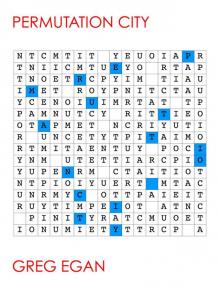 Permutation City
Permutation City The Eternal Flame
The Eternal Flame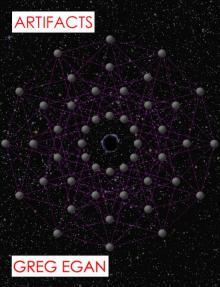 Artifacts
Artifacts Wang's Carpets
Wang's Carpets Dichronauts
Dichronauts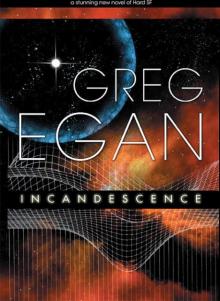 Incandescence
Incandescence Teranesia
Teranesia Schild's Ladder
Schild's Ladder Quarantine
Quarantine The Four Thousand, the Eight Hundred
The Four Thousand, the Eight Hundred The Clockwork Rocket
The Clockwork Rocket Zeitgeber
Zeitgeber Phoresis
Phoresis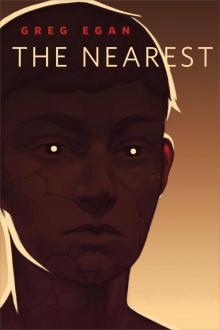 The Nearest
The Nearest Diaspora
Diaspora Instantiation
Instantiation Distress
Distress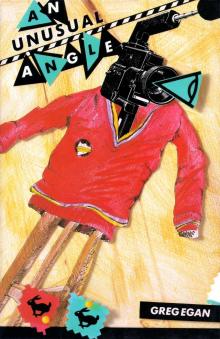 An Unusual Angle
An Unusual Angle Oceanic
Oceanic The Arrows of Time
The Arrows of Time Axiomatic
Axiomatic![Anthology 2. Luminous [1998, 2010] Read online](http://i1.bookreadfree.com/i/03/18/anthology_2_luminous_1998_2010_preview.jpg) Anthology 2. Luminous [1998, 2010]
Anthology 2. Luminous [1998, 2010] Perihelion Summer
Perihelion Summer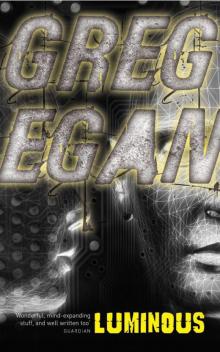 Luminous
Luminous